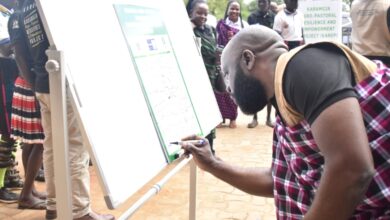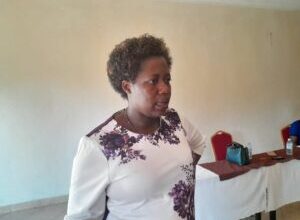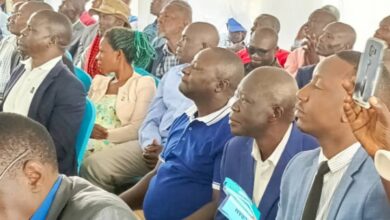Floods destroy over 1,000 gardens of crops in Bukedea
He said the only crop to be cultivated in water-logged areas is rice.
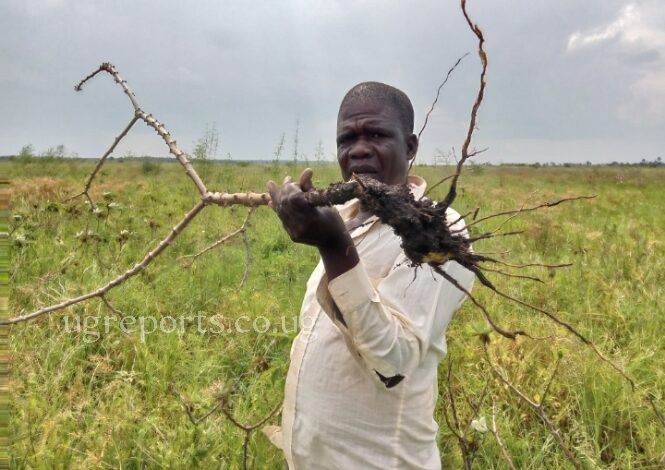
Bukedea: A total of 1,635 gardens of crops have been destroyed by floods in Kamutur Sub County in Bukedea district.
The destroyed gardens consist of crops such as cassava, maize, millet, sorghum, and groundnuts.
In the parishes of Kamutur, 150 gardens were destroyed, 50 gardens in the parish of Akakaat, 400 gardens in Tajar, 600 gardens in Acomai, and 435 gardens in Kocus parish were all destroyed.
Mr. James Peter Okwi, the LC1 chairperson of Malaba village, one of the villages in Kocus parish, said the floods displaced a total of fifteen households from their homes to the nearby trading center.
“People are starving at the trading center renting; the water destroyed all their crops, including houses and pit latrines,” said Mr. Okwi.
Mr. Okwi also added that about 71 pit latrines were washed by floods, and as a result, the residents are forced to defecate in open places such as bushes.
“In my area, there’s nothing like the pit latrine; people are now defecating in the bushes,” Okwi said.
On June 4, 2024, this publication also discovered that 244 households were destroyed and 200 pit latrines in Kamutur sub-county.
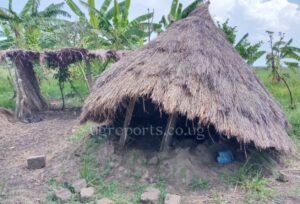
Mr. David Obwatan, one of the victims affected by the floods, told this publication that all his houses and property were destroyed by the floods.
“All the household proper were buried inside, including chicken. Now I’m forced to rent at the trading center at the cost of twenty thousand shillings every month, and I am not able to afford food. All the gardens of cassava, maize, millet, and groundnuts were destroyed,” said Mr. Obwatan.
Sarah Akello, another farmer, said she invested her parish model fund of $1 million in hiring a garden for planting maize, but all that has been washed away by floods.
“I am not sure where to get the money for repaying the PDM loan; all my gardens of maize were swept by floods,” said Ms. Akello.
Mr. Obwatum also added that access to food is one of the biggest challenges in experiencing life as a family.
“There were ten members in the family, and now access to food is our major challenge. The water has been reduced, but even I cannot manage to rectify the houses,” said Mr. Obwatum.
However, some of the displaced residents residing in the nearby church were found scattered in other people’s gardens, seeking survival.
Mr. Jackson Ojekede, Kamutur LCIII chairperson, said the subcounty has no budget for handling such emergencies.
“We submitted the report to the district for help, but in our subcounty we do not have a budget. I am appealing to the well-wishers to come and support us. My people are not doing well,” said Mr. Ojekede.
Ms. Mary Akol, the Bukedea district LCV chairperson, says the district compiled the report of the affected families and submitted it to the office of the prime minister.
“Red Cross society intervened, and the victims received some support; however, the majority missed,” said Ms. Akol.
Jude Ongota, the district agricultural officer in Bukedea, advised farmers who are in flood-prone areas to adopt a water harvesting system that will help them during the dry season.
He said the only crop to be cultivated in water-logged areas is rice.
“I want to advise Kamutur farmers to adopt the system of harvesting water during rain and learn how to construct water diversion channels that will help us divert water out of the crops,” said Mr. Ongota.
Mr. David Oluka, the Bukedea district senior environmental officer, told this publication on Firda June 7, 2024 that the main cause of the floods is man-made activities.
He said Kamutur, being the lower belt of Mt. Elgon, acts as the water basin; therefore, any rain or water that falls from Mt. Elgon is collected in Kamutur Sub County.
“The people of Bulambuli are still cultivating on the wetlands, and the River Sironko is distilled, yet it’s one of the ways to contain the water from Mt. Elgon. In order to avoid floods or prevent floods from affecting the people of Kamutur, man-made activities should be stopped,” said Mr. Oluka.
Mr. William Wilberforce Tukei, the Bukedea Resident District Commissioner, said the district is doing its best to ensure that wetland encroachers are evicted.
He said the president’s directive stated that no person should be cultivating the wetland.
“My office is going to send a letter to Bulambuli district so that we can come together to see that the rice in the wetland bordering Bukedea and Bulambuli will come to an end,” said Mr. Tukei.
Do you have an advertisement or article you want to publish? Mail us at theugreports@gmail.com or WhatsApp +256757022363.


